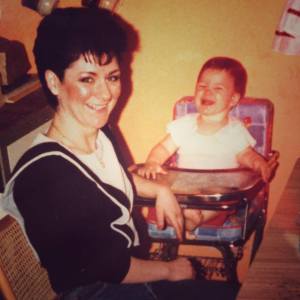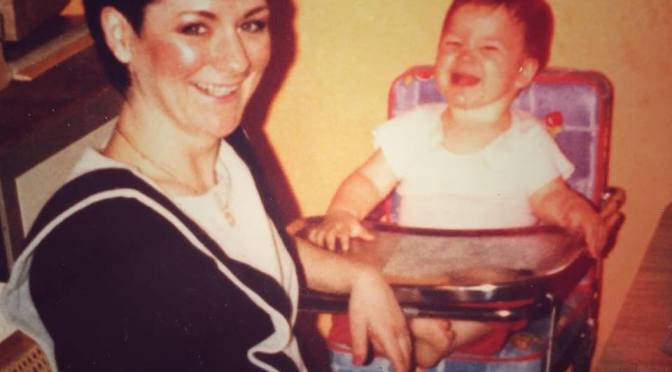A little over two years ago, Blake Ragghianti…

…was sitting on my living room couch expounding on music, poetry, Jeff Buckley and, “oh,” he says to me, “get a piece of chalk and write this on your board… I’m not too certain about this yet,” he adds, “but I believe there is something there. So write down these four questions, we need to think about them…”
- Is it true?
- Is it absolutely true?
- How do you feel about it?
- Who would you be without it?
- Turn it around.
“That’s it?” I asked him.
“Yes, well,” he stammered, “I believe so, I’m not sure that’s all of it though.”
What Blake was referring to was his recent discovery of the methodology of Byron Katie; simply entitled, “The Work.” It was a methodology that he would soon perfect, a methodology that he would attempt to get certified in. As far as I am concerned, his mastery of the questions is certification enough for me.
Who is Byron Katie?
Besides someone who looks like she’s about to try and sell you an arthritis bracelet…

Many sources give her the label of a “spontaneously enlightened being.” This is something that I don’t agree with entirely; which is to say that it is something that I do not entirely disagree with. Recalling the story from memory now—Katie was in a massive state of depression for much of her life and as she lay on her bedroom floor (for she felt undeserving of a bed) she realized suddenly that nothing that she believed was true.
Is this true? That everything we believe isn’t true?
Uncertain.
I know that what I believe is absolutely a product of my, and only my, what they call, connectome.
[For an interesting and poignant video on what a connectome is I refer you to a Ted.com lecture featuring Sebastian Seung called, “I am my connectome.”]
In other words I know that what I believe is a product of my subjective reality. My beliefs are a product of my story and mine alone.
I believe that the smell emanating from The Original French Market Restaurant at the corner of St. Philip and Decatur Street in New Orleans is in the top 3 most beautiful things I have ever smelled. My friend Kelly adamantly disagrees with me.
Does this make this a beautiful smell or not?
A person walks into a room and tells a joke. Simultaneously I laugh and Kelly does not. Is the joke teller a funny person?
I believe that a Sage and Gin Gimlet is a delicate and sensual libation that shakes me upside down with a single sip. Would Kelly think so? Does this make this drink a perfect drink?
I could listen to Al Bowlly for hours on end. Does this make him a good musician?
I believe that, again, my beliefs are a product of my history, my story.
This is the basic foundation of Byron Katie’s work. Because, if your beliefs really are only a product of your story then what you have are a myriad projections onto the world around you. And, accordingly, the world around you will reflect who you truly are. The world around you will reflect your story always, all ways.
In other words – everything is a cloud.

(What do you see?)
And if the world reflects who you truly are, if everything is truly a projection then we create our own reality.
Byron Katie’s questions are a means to accessing peace for the troubled times. For, as she states, when our beliefs are leading us on an exciting and beautiful path they don’t need the Work. Why? Because they are, “already working for us.”
Let’s try an example here then. A deliberate example. Something I have wanted to work on for a while now.
My mother should not have committed suicide…
Yes, that’ll do just fine for an example.
(Those questions that Blake had me write on my chalkboard weren’t exactly right. And though I will be working through an example of the questions right now, you can directly download instructions from Byron Katie’s website here or here.)
Is that true?
The only way something shouldn’t be happening is if it isn’t. The only way something should not have happened is if it didn’t. Otherwise I would be simply arguing with reality and I’m not that arrogant.
How do you think, feel and react when you believe the thought, “my mother should not have committed suicide,” and she still isn’t alive? She still did commit suicide?
I miss her, a lot and often. It’s one thing to have to mourn the loss of a person, it’s an entirely other thing to mourn the loss of a future with them. I feel a sense of anguish, shame, guilt, fear, anger, depression when I think about her committing suicide instead of getting help. I’m angry that she didn’t call me or call someone. I’m just fucking hurt.
And who would you be without this thought? Imagine your mother, she’s passed away and you are incapable of thinking the thought, “ she shouldn’t have committed suicide?” Who are you and what is your relationship to her now? Who is she now?
I am still me. I am living my life, existing. Still attempting to follow my excitements and joys. When I think of her without this thought… Without this thought I respect that she is passed. Without this thought I am ok with her being gone. Without this thought I am living in the present and excited for tomorrow. Without this thought, she is still very much alive in my heart.
At which point comes one of the self-contained epiphanies… It isn’t my mother’s suicide that is disturbing me, it is my thought concerning her suicide that is disturbing me.
Now, turn it around to the other…
My mother should have committed suicide…
Now provide at least 3 reasons why this is more true than the original statement.
- She was wrestling with demons so much larger than her it was as if Cain and Abel were trapped inside of one body. A diagnosis of Manic Depression, Borderline Personality Disorder, an extreme alcoholic, cocaine addict. Notwithstanding the 3 warrants out for her arrest.
- She existed in a hell that only she could see and she was on a steady decline. She’d tried every therapist, every pill.
- It was her life, and it is, as I believe, the ultimate act of free will to commit suicide.
- She’s at peace. Even the Catholics changed their doctrine, “suicides” no longer go to hell. According to the Catholic church people no longer, “commit suicide,” but rather, “die from suicide,” as they would from any other disease because the suicide has had their mind taken by illness.
- This list could extend much further I’m certain.
Now, turn it around to the self…
I should not have committed suicide…
- Because I am not my mother.
- Because I believe in the 50% rule
- Because I know the pain I have gone through, I know the pain that those living have gone through, I know what those people around me would feel if I did.
- Because I know that life gets better all of the time. Regardless of depression or pain, I have seen many more happy days and exciting days that I have their opposites.
I certainly miss my mother, there is no question about this.
The point is, however, that Byron Katie’s method allows you to get to the core of the material that hurts you the most. You learn that your reality is a conglomeration of your projected beliefs and that when you are believing something negative– it isn’t true.
I’ve learned not to argue with reality, to “love what is,” to let go of that which is emotionally damaging. To keep what is emotionally healing and to learn from my past.
Every time I put something through, “The Work,” I’m given a unique perspective on myself and the world within which I project and live.
But then again…
Maybe none of that is true either…












